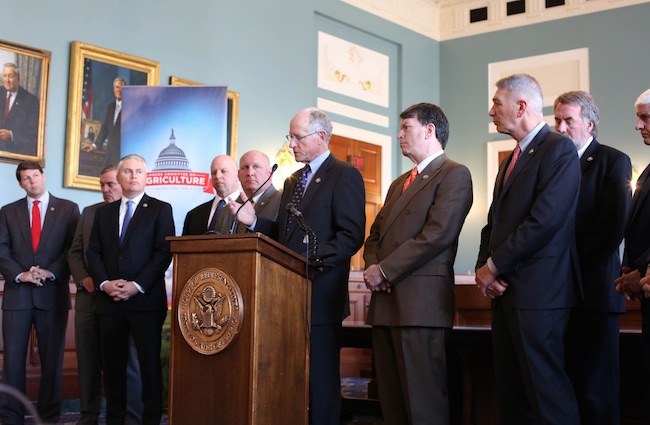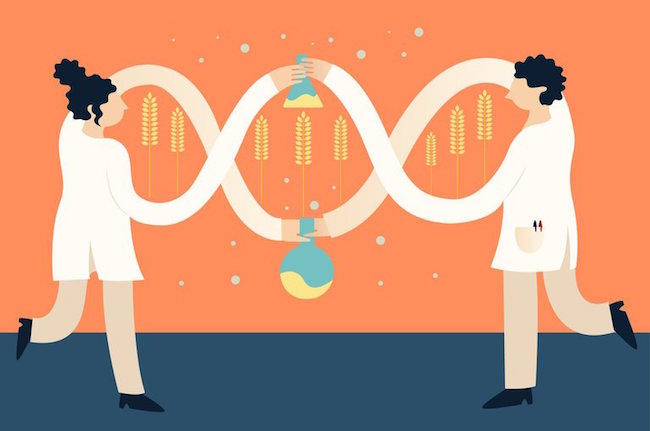
Despite a Few Positives, The Farm Bill Will Create Real Harm to the Organic Industry
(Photo courtesy of U.S. House Committee on Agriculture)
With a draft of the farm bill having passed the Agricultural Committee, it now will be debated on the House floor beginning on May 9th.
There is some good news. There is some bad news. And there is some really disturbing news.
THE GOOD
* An additional $5 million in funding to improve enforcement and data-tracking systems of imported organic food.
* Funding for the Organic Agriculture Research and Extension Initiative goes from $20 million annually to now $30 million annually. Plus, it adds “soil health” as an additional priority for the program.
The $30 million is less than the $50 million that was proposed, but it is an increase nevertheless.
* A one-time $5 million payment for the funding of the Organic Data Initiative, which would help improve collection of data related to production and sales. An additional $5 million annually will be granted through the appropriations process.
THE BAD
* No provisions to help further develop public plant and animal breeding programs, a critical infrastructure need for farmers.
* Three harmful provisions were added that will impact the National Organic Standards Board (NOSB).
First, there is now a provision that allows the farmer, handler and retail seats of the 15-member board to be filled with employees. What is worrisome is that it could put people with no domain expertise into very important voting positions.
Second, there is now a provision requiring the NOSB to establish a task force to review any petition regarding materials that have been approved by FDA or EPA and to allow the agency to consult with the NOSB about these materials. This will give the EPA and FDA undue influence over the NOSB, particularly in regards to approving synthetic materials in organic.
Third, there is now a provision that allows the Secretary of the USDA to create an expedited process for reviewing materials for inclusion on the National List that are related to post-harvest handling and food safety. This could prevent the NOSB from spending the appropriate amount of time researching, discussing and analyzing a proposed ingredient or material.
* There are two very important programs that help farmers offset the cost of organic certification — the National Organic Certification Cost Share Program and the Agricultural Management Assistance Program. The farm bill eliminates funding for both of these programs.
IN SUMMARY
While we did get an increase in funding for organic research, data collection and enforcement of imported organic food, the provisions to the NOSB are incredibly troubling. Not only is the value of this expert advisory committee coming into real question, but a watered-down NOSB diminishes the integrity of the organic seal.
Yet, the most disturbing piece of the legislation has to do with the elimination of the cost-share program for organic certification.
“The impact is going to be dramatic. Younger organic farmers and those that operate small family-farms may decide it is not worth it and may drop out of the program,” said Jim Gerritsen, president of the Organic Seed Growers and Trade Association and founder of Wood Prairie Family Farm, a Maine potato farm that has been certified organic for 36 years.
As it stands now, less than 1% of farmland in the U.S. is organic. And with organic comprising 5% of the overall food industry, we need more organic farmers, not fewer. Our government should be following the lead of a country such as Denmark, who is spending hundreds of millions to advance organic farming.
Furthermore, if we have a decreased number of organic farmers in the U.S., then we become more reliant on imports and an even greater amount of money is needed to fight fraudulent products from abroad.
But, will additional funding be a panacea?
As John Bobbe, Executive Director of OFARM (Organic Farmers’ Agency for Relationship Marketing), whose Minnesota-based organization represents organic grain and livestock producers in 19 states, recently told me, “It is questionable whether more money will be enough, largely because the USDA is reactive rather than proactive.”
Case in point is the 25,000 metric tons pounds of purportedly “organic” corn that a district judge has ruled cannot be unloaded at a U.S. port. This was most likely the result of an investigation by OFARM — a farmer cooperative — who filed a formal complaint with the USDA on February 21st about possible fraudulent grains coming into the country.
Nevertheless, as The Washington Post, Organic Insider and other outlets have been reporting on fraudulent organic grains from abroad over the past year, the government is certainly paying more attention.
This afternoon, OFARM informed Organic Insider that the ship filled with “organic” corn was on its way to Panama, as a result of being denied entry into the U.S.
That doesn’t ease the pain of the farm bill, but it is a small victory for American farmers and consumers, and is unquestionably a step in the right direction.
********
QUOTE OF THE WEEK
“Nothing is more important to Impossible Foods than the health and safety of our customers.” — Rachel Konrad, Chief Communications Officer for the company.
Interesting. Despite the fact that the FDA disagreed with Impossible Foods’ safety assessment of its genetically-engineered soy leghemoglobin — a protein that has never been in the human diet before — the company sold the Impossible Burger to the public anyhow and failed to warn consumers about the FDA’s concerns.
 |
Have a great day! 
Max Goldberg, Founder |
Quick Hits
* The CBD craze has hit high-end LA juice bars, such as Moon Juice and Juice Crafters.
* Pressed juice and organic meal company Urban Remedy has chosen San Diego to be its first location outside of the Bay Area.
* Swedish chef Helene Henderson, the founder of the Malibu Farm Pier Café and Restaurant in Malibu, CA, brings her organic Malibu Farm Miami Beach to the Eden Roc Miami Beach. The restaurant is set to open to the public this Saturday, April 28.
* Believing that consumers lack the necessary intelligence to truly understand the benefits of genetic engineering and CRISPR technology, David Fikes of the Food Marketing Institute asks the preposterous question — Are We Genetically Predisposed to Misunderstand Gene Engineering?
* Maybe we are just predisposed to the belief humans cannot outwit Mother Nature.
* On Living Maxwell, I discuss why the word “sustainable” is no longer serving our needs.
* At Finca Luna Nueva, a regenerative farm in Costa Rica, Tom Newmark and his team are hand-pollinating vanilla orchids.
* Congrats to Carey Gillam! Her book — Whitewash: The Story of a Weed Killer, Cancer, and the Corruption of Science — has been named an Outstanding Book of the Year by the Independent Publishers Book Awards.
* Sugar and artificial flavors/colors are making a comeback in cereal — a very sad commentary on where we are as a society.
* In Big Ag country, not all of the farmers are sold on cover crops.
Weekly News Summaries


EU Bans Hydroponics in Organic, Tightens Up Regulations
By Katy Askew
The EU has taken a number of very positive steps to boost the organic sector, including banning hydroponics, increasing the supply of organic seeds, and implementing strict, risk-based checks along the supply chain.
Suspected Shipment of Fraudulent Organic Grains Remains Offshore
In what has arguably become the most important issue in the organic industry -- fraudulent organic grains from abroad -- a district judge has ruled that Sunrise Food International's 25,000 metric tons of “organic” corn cannot be unloaded into the U.S.

Amazon Sees Online Grocery Sales Surge by 50%
By Jeff Wells
One Click Retail reported that Amazon's online grocery sales grew 50% versus the first quarter of 2017, and beverages accounted for 9 of the 10 best-selling grocery products.

With All of the Policy Changes at Whole Foods, Brands are Looking Elsewhere
By Krystal Hu
Facing increased fees and new restrictions on brokers, brands are looking at other distribution outlets and are finding a very welcome reception at chains such as Kroger and Albertsons.


The New York Times Advocates for GMOs
By Jane Brody
In an incredibly disappointing and flawed op-ed, Jane Brody makes the case for GMOs yet fails to mention, among many other things, the millions of acres of superweeds that we now have because of GE-crops.

Industrial Hemp Farming Bill Introduced, CBD Covered as Well
By Elaine Watson
The Hemp Farming Act of 2018 would remove federal roadblocks to industrial hemp farming throughout the U.S. and clarify the legal status of CBD.

Millennials Prefer Prepared Foods....and Interesting
By Pamela DeLoatch
With a demographic of about 75 million strong, Millennials prefer prepared foods, want to know where their food comes from, and lean towards unique and interesting options.


Süprmrkt is Bringing Affordable Organic Foods to Low-Income Areas of LA
With food deserts being a real problem in low-income areas of Los Angeles, founder Olympia Auset started an organization called Süprmrkt to address this serious issue.

The Goods Mart Enters the Healthy Convenience Store Category
By Rina Raphael
Founded by a veteran food and wellness PR executive, The Goods Mart aims to be a hybrid of Whole Foods and 7-Eleven.

Whole Foods Announces Winners of its Supplier Awards
At a reception held in Austin, Whole Foods Market announced the winners of its sixth annual Supplier Awards, which included a total of 27 perishable and non-perishable suppliers.
The material in this newsletter is copyrighted and may be reprinted by permission only. All requests must be in writing. Please use our contact form to request republication rights.
Newsletter Archive
Quick Hits
* The CBD craze has hit high-end LA juice bars, such as Moon Juice and Juice Crafters.
* Pressed juice and organic meal company Urban Remedy has chosen San Diego to be its first location outside of the Bay Area.
* Swedish chef Helene Henderson, the founder of the Malibu Farm Pier Café and Restaurant in Malibu, CA, brings her organic Malibu Farm Miami Beach to the Eden Roc Miami Beach. The restaurant is set to open to the public this Saturday, April 28.
* Believing that consumers lack the necessary intelligence to truly understand the benefits of genetic engineering and CRISPR technology, David Fikes of the Food Marketing Institute asks the preposterous question — Are We Genetically Predisposed to Misunderstand Gene Engineering?
* Maybe we are just predisposed to the belief humans cannot outwit Mother Nature.
* On Living Maxwell, I discuss why the word “sustainable” is no longer serving our needs.
* At Finca Luna Nueva, a regenerative farm in Costa Rica, Tom Newmark and his team are hand-pollinating vanilla orchids.
* Congrats to Carey Gillam! Her book — Whitewash: The Story of a Weed Killer, Cancer, and the Corruption of Science — has been named an Outstanding Book of the Year by the Independent Publishers Book Awards.
* Sugar and artificial flavors/colors are making a comeback in cereal — a very sad commentary on where we are as a society.
* In Big Ag country, not all of the farmers are sold on cover crops.
